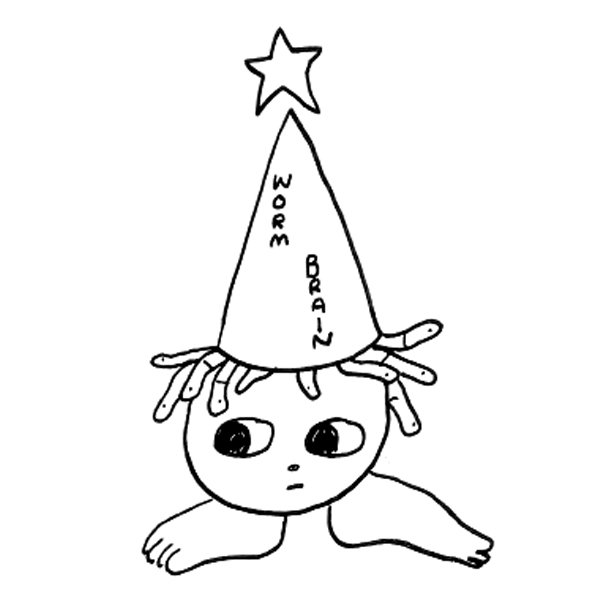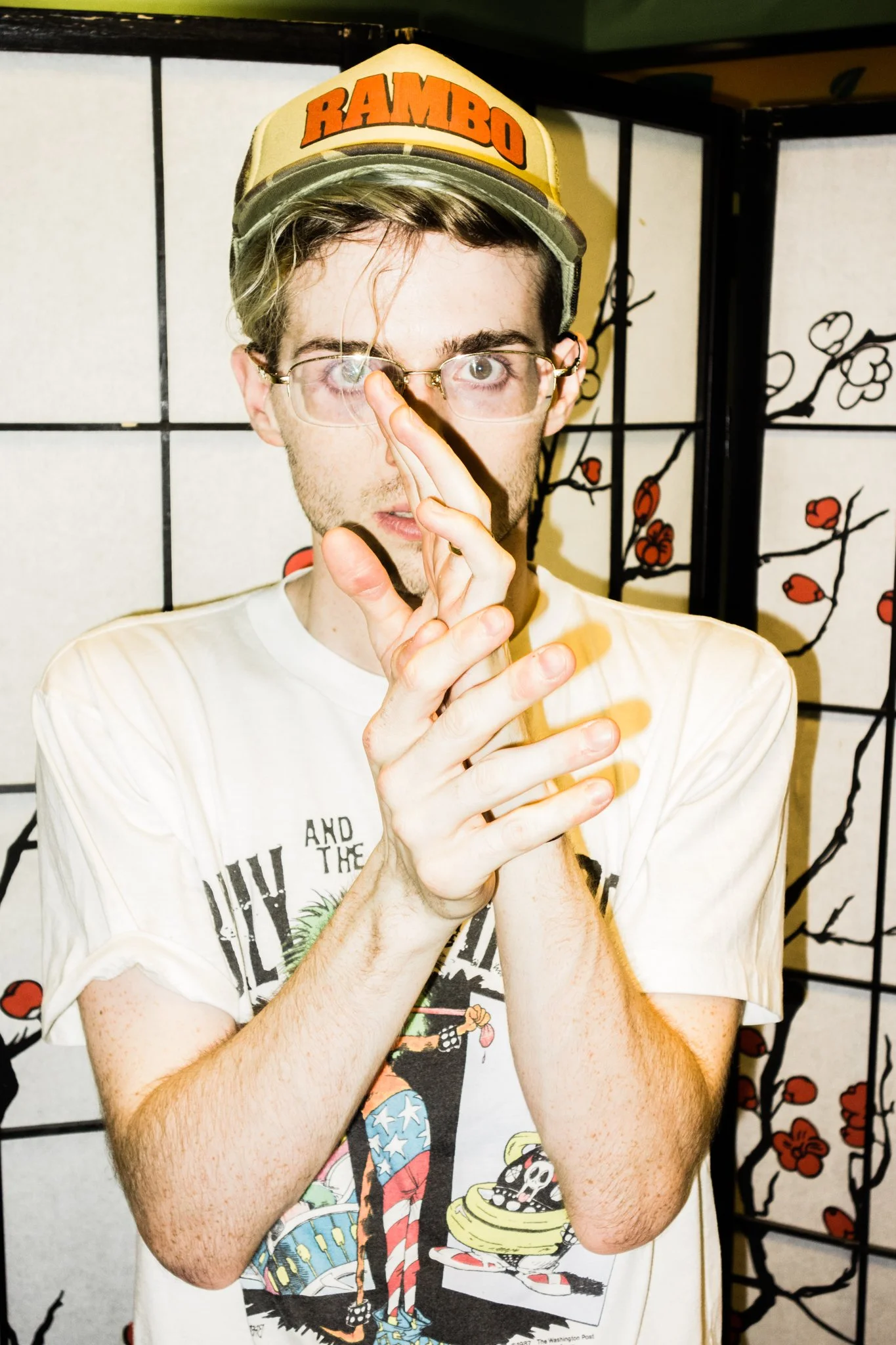Developing the New: In Convo with Sam Ray, Pt. 2 — On Songwriting
“I don't really always write from any particular way or point of view or anything,” Sam Ray told Wormbrain, as our conversation shifted from film photography primarily to songwriting. The previous half of our chat can be read in a past W.W post right here. “Probably most frequently, however, it's a blend of the two — a more universal version of myself, where by opening it up to a wider and broader and somewhat more vague P.O.V. — a more universal thing, it allows for something more personal than simply singing in dull first person, about myself, my life, my thoughts, my whatever.”
This past spring when Wormbrain World initially spoke to Sam Ray for this interview, his longstanding project Teen Suicide had just released “coyote (2015-2021)” earlier that week, the first new music under that moniker in half a decade at the time. The track was a surprise then, as those Teen Suicide fans keeping score at home remembered 2016’s Bonus EP was said to be the band’s last record. In the time since our conversation, an entire album has fleshed around that lone single — titled honeybee table at the butterfly feast, the collection of 16 exquisite and essential ‘all killer, no filler’ Teen Suicide songs that could easily be held up amongst the band’s legacy, as released by their steadfast and loyal label Run For Cover Records back on August 26th, 2022 — and fans have even had a few months to sit with it all.
“I don't like to write as ‘myself’ and almost never do that,” Ray continued. “I'm not sure there are more than maybe, five or ten songs over the many albums I've made where I can say definitively that the song is simply ‘me writing and singing, simply as me.’ At the same time, I almost never take on a specific character or P.O.V. in that way, nor do I like to write ‘story songs’ as ya might call them - as much as I love other artists who are able to do so so easily and perfectly, like Townes Van Zandt or Blaze Foley.”
“Things have meaning because they don’t.”
Photo courtesy of the artist.
That said, the Sam Ray discography is deep and broad enough that there can be no hard rule on where his songwriting comes from. Recalling a track where he does approach lyrics as himself, Ray said, “A good example would be the song 'starry cat' from the album 'starry cat' under the artist name starry cat which is simply a song about - and to - my big wonderful cat Mozart ("big man") who had died a few weeks before.”
Like a choose-your-own-adventure of interpretation, the core of Ray’s lyrical output is something he described as “akin to urban legends - someone having or imagining an experience, which then gets shared with others, who repeat it, as a sort of telephone-game almost, and each person gives the story their own meaning, and thus it takes on a new twist, until it's changed into something different, and eventually stripped bare of its original pretensions and simply exists as a kind of Rorschach test for whoever comes across it, for them to see in it whatever they may see - and in this process, something that may or may not have much truth to it in the first place, and is almost certainly always exaggerated, attains a higher degree of truth because of it's falsity.”
“I don’t like to write as ‘myself’ and almost never do that”
Photo courtesy of the artist..
Wormbrain asked Sam Ray to go long on the experiences behind the lyrics to Teen Suicide’s single “coyote (2015-2021) and he told W.W:
“In the simplest terms, I wrote ‘coyote’ because I was driving through the middle of nowhere, somewhere in America, with only fields and fields and fields and trees, in that order, and I saw a dead dog — maybe a coyote — I don't really remember now which — and a hawk far away, later on. This blended, then, to include both. From that mostly-true origin — a dead dog or coyote, a hawk, the absolute dead-center of American midwestern nothingness, the road.
I started to see the song as representing endlessness. The beginning section, the five or so minutes of what started as simply droning and repetition, represented the endless of that drive, of any drive anybody would do through the same or similar parts of the country, of any country — which began to be about true endlessness — about death and rebirth as an uneven line, rather than a cycle. About memory, about purgatory, and eventually about eternal recurrence and the fallacy of death/rebirth/life really altogether — big themes on the album, altogether, along with some others which I won't get all into now.
Is it my memory? The hawk, the coyote, they are — to the degree I remember it, at least — and in that sense, the song is literal, as it's about that — but to me, it's about something much more, and in taking it there, it ceases being about me at all, yet it doesn't become someone else either.
Did I have an experience like the detailed apple-tree one? No, I was thinking about heroin - back then, I mean - and as I was sitting in a moving vehicle through the center of the country, thinking about - but not using - heroin. I was staring at a tree - not an apple tree, just a tree - and thinking about how if I had heroin, endlessly, I could spend an entire lifetime sitting under that tree, staring at the sky, alone — sort of like in The Stranger, when he's in prison, musing on the same thing, being born in the trunk of a tree.
The song has nothing to do with heroin of course, just like my experience has nothing to do with apples, nor memory, nor childhood - but it's not some other character’s memory either, in this case. It just sort of ‘is.’ It exists because it chose to, I assimilated it, if anything, by chance, into the lyrics. I began thinking about all of these things I mention above, and somehow it became an apple tree, and it became absolutely pivotal - do I know why it's pivotal? No fucking clue, but I think that's what's best about it, to me.
Things have meaning because they don't. They start with none, meaning is ascribed as if by chance, to something arbitrary — memory of the hawk, the dead animal, and now the random solitary tree — thinking about it — and to write a song you usually think about something a lot, over and over, endlessly and hyper-specifically.
That original meaning isn't lost so much as changed into something new. The original personal P.O.V. is lost. A new, bigger point-of-view is gained, but again, basically by chance, the end result has both the remnants of the original, absolutely banal — but to me, beautiful, because I experienced it to a degree, I guess — meaning, laid bare, as well as the broader one known to me, but probably — hopefully — felt by someone else, anyone else, listening or reading. That’s the hope, at least.”
W.W: What is Wormbrain?
SR: There's a vibration which exists deep underground, and if you get a shovel & dig a hole deep enough, for long enough, and get down far enough into the dirt you no longer see the sun - at that point, if you dig a little deeper, just enough to fit your head, and stick your head under the soil, you'll hear the vibration all around and it'll rattle your head & shake your skull inside it. When your skull shakes, it'll make a sound which only you can hear. If you close your eyes and listen to it and let it shake your brain around inside your skull, and your skull around inside your head, you'll see it.
W.W: Thank you for sharing with Wormbrain.
SR: Alternately - ♪♫ when the moon hits your eye like a big pizza pie, thats a-wormbrain ♪♫
W.W: Thank you for sharing with Wormbrain.
Teen Suicide’s honeybee table at the butterfly feast is out now for via Boston, MA label Run For Cover Records.



